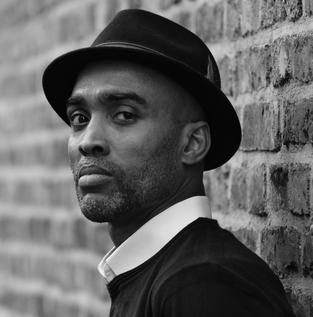
Tanita Tikaram is a British pop/folk singer-songwriter. She achieved chart success with the singles "Twist in My Sobriety" and "Good Tradition" from her 1988 debut album, Ancient Heart.
An all-female band is a musical group in popular music that is exclusively composed of female musicians. This is distinct from a girl group, in which the female members are solely vocalists, though this terminology is not universally followed. While all-male bands are common in many rock and pop scenes, all-female bands are less common.

Brothers Keepers is a German-based transnational anti-racism project, bringing together hip hop, reggae and soul musicians, headed primarily by Afro-Germans. Their debut single, "Adriano-Letzte Warnung", was written in response to the murder of Alberto Adriano by Neo-Nazis. It remains their most popular release, with more than 6 million views on YouTube.

Sabrina Setlur, formerly known as Schwester S., is a German rapper. Her debut was in 1995 under the guidance of 3p Records executive and mentor Moses Pelham, producer of her breakthrough single "Ja Klar". Following the drop of her pseudonym and a number-one single, "Du liebst mich nicht", in 1997, a series of hit records established her position as Germany's "best known and highest-selling female rap act" to date.
Gisela Bock is a German historian. She studied in Freiburg, Berlin, Paris and Rome. She took her doctorate at the Free University Berlin in 1971 and her Habilitation at Technische Universität Berlin in 1984. She has taught at the Free University Berlin (1971–1983) and was professor at the European University Institute (1985–1989) in Florence, Italy, at the University of Bielefeld (1989–1997) and then at the Free University Berlin. She retired in 2007.

Nadja Benaissa is a German singer and television personality. She rose to fame in late 2000 when she auditioned for the German adaption of the reality television show Popstars and became a member of the girl group No Angels, one of the best-selling girl groups of European origin of all time. During their hiatus, Benaissa released her solo album, Schritt für Schritt (2007), which produced the single "Ich hab dich", and represented Hesse in the Bundesvision Song Contest 2006 with the song, finishing in fourth place.

Marianne Rosenberg is a German Schlager music singer and songwriter.

A sister is a woman or a girl who shares parents or a parent with another individual; a female sibling. The male counterpart is a brother. Although the term typically refers to a familial relationship, it is sometimes used endearingly to refer to non-familial relationships. A full sister is a first-degree relative.

Rosenstolz was a German pop duo from Berlin that was active between 1991 and 2012 and had chart hits in Germany, Austria and Switzerland. The duo consisted of singer AnNa R. and musician Peter Plate, who occasionally provided vocals. Rosenstolz achieved major chart success after the nineties, with five studio albums going to No. 1 in the German albums chart. Although the duo split up to pursue separate music careers, they left open the possibility of a future reunion.

Helen Schneider is an American singer and actress working mainly in Germany.

Mandy Grace Capristo, also known mononymously as Mandy, is a German singer and songwriter.

German singer Xavier Naidoo began his music career in the early 1990s. His debut studio album, Seeing Is Believing, was released in 1994, consisting mostly of cover versions of traditional tracks and soul songs from the 1960s and 1970s. Released in the United States only, it failed to chart on the Billboard 200 and thus, was never released in Europe. Following a fall-out with main producer Nicole Dürr, he signed with Frankfurt am Main-based Pelham Power Productions (3P) and began appearing as a background vocalist on several of his label-mates' albums. Naidoo's second studio album Nicht von dieser Welt, produced unter the guidance of Moses Pelham and Martin Haas, was released in May 1998. The album peaked at number one on the German Albums Chart and sold more than a million copies. Its singles included his debut single "20.000 Meilen", the top twenty entries "Nicht von dieser Welt" and "Seine Straßen" as well as top five hit "Sie sieht mich nicht", which served as the theme song for the feature film Asterix & Obelix Take On Caesar (1999). A gold-certified live album of his first concert tour, simply titled Live (1999), reached the top ten in Germany the following year.

Tanja Gisela Hewer, known by the stage name Michelle, is a German schlager singer. She represented Germany in the Eurovision Song Contest 2001 with the song Wer Liebe lebt, which placed eighth from 23 participating countries with 66 points. Since her debut in 1992 she has won numerous awards, including two Echo awards, two Goldene Stimmgabeln and two Amadeus Austria awards. She sold more than 6,2 Million Copies in Europe.

Adegoke Odukoya, better known as Adé Bantu, is a Nigerian-German musician, producer and social activist who is the front man of the 13 piece band BANTU and the creator of the monthly concert series and music Festival Afropolitan Vibes which holds in Lagos, Nigeria. Adé Bantu is also the founder of the Afro-German musical collective Brothers Keepers. His band BANTU received the Kora Award for their album Fuji Satisfaction in 2005.
Riot grrrl is an underground feminist punk movement that began during the early 1990s within the United States in Olympia, Washington, and the greater Pacific Northwest, and has expanded to at least 26 other countries. A subcultural movement that combines feminism, punk music, and politics, it is often associated with third-wave feminism, which is sometimes seen as having grown out of the riot grrrl movement and has recently been seen in fourth-wave feminist punk music that rose in the 2010s. The genre has also been described as coming out of indie rock, with the punk scene serving as an inspiration for a movement in which women could express anger, rage, and frustration, emotions considered socially acceptable for male songwriters but less commonly for women.

Mamadie Wappler, known professionally as Mamadee, is a German reggae singer.

Women in Music play many roles and are responsible for a broad range of contributions in the industry. Women continue to shape movements, genres, and trends as composers, songwriters, instrumental performers, singers, conductors, and music educators. Women's music, which is created by and for women, can explore women's rights and feminism. Women in music impact and influence creativity, activism, and culture.
Abiodun Odukoya, better known as Abiodun, is a Nigerian-German singer, songwriter, producer and music arranger. Abiodun's name is of Yoruba origin and means "he who is born on a day of festivity". He is better known as the co founder of the Afro German music collective Brothers Keepers and as one of the pioneers of the German reggae, afro and soul music scene.

Onejiru is a contemporary Germany-based jazz singer. She was born in Kenya and moved to Germany when she was a teenager. Her real name is Pielina Wanjiru Schindler, with stage names Onejiru and Onejiro Schindler.

Veronika Fischer, also called Vroni, is a German singer.
















